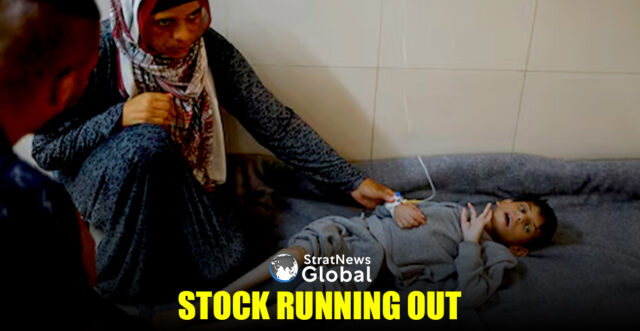Gaza is nearing a critical shortage of specialised therapeutic food essential for saving severely malnourished children, according to the United Nations and humanitarian agencies.
“We are now facing a dire situation, that we are running out of therapeutic supplies,” said Salim Oweis, a spokesperson for UNICEF in Amman, Jordan, told Reuters on Thursday, saying supplies of Ready-to-Use Therapeutic Food (RUTF), a crucial treatment, would be depleted by mid-August if nothing changed.
“That’s really dangerous for children as they face hunger and malnutrition at the moment,” he added.
Oweis said UNICEF had only enough RUTF left to treat 3,000 children. In the first two weeks of July alone, UNICEF treated 5,000 children facing acute malnutrition in Gaza.
Nutrient-dense, high-calorie RUTF supplies, such as high-energy biscuits and peanut paste enriched with milk powder, are critical for treating severe malnutrition.
“Most malnutrition treatment supplies have been consumed, and what is left at facilities will run out very soon if not replenished,” a World Health Organisation spokesperson said on Thursday.
The WHO said that a programme in Gaza that was aiming to prevent malnutrition among the most vulnerable, including pregnant women and children under five, may have to stop work as it is running out of nutritional supplements.
Stocks Running Out
Gaza’s food stocks have been running out since Israel, at war with Palestinian militant group Hamas since October 2023, cut off all supplies to the territory in March, lifting that blockade in May but with restrictions that it says are needed to prevent aid being diverted to militant groups.
As a result, international aid agencies say that only a trickle of what is needed, including medicine, is currently reaching people in Gaza.
Israel says it is committed to allowing in aid but must control it to prevent it from being diverted by militants. It says it has let enough food into Gaza during the war and blames Hamas for the suffering of Gaza’s 2.2 million people.
COGAT, the Israeli military aid coordination agency, in response to emailed questions on RUTF supplies, said it was working with international organisations to improve the distribution of aid from the crossings where hundreds of aid trucks were waiting.
Save the Children, which runs a clinic that has treated spiking numbers of malnourished children in central Gaza, said it had not been able to bring in its own supplies since February and was relying on United Nations deliveries.
“If they’re going to run out, that’s also going to affect UNICEF partners and other organisations that rely on their supplies to provide that for children,” said Alexandra Saieh, Global Head of Humanitarian Policy and Advocacy at Save the Children.
Malnutrition Crisis Deepens
UNICEF said that from April to mid-July, 20,504 children were admitted with acute malnutrition.
Of those patients, 3,247 were suffering from severe acute malnutrition, nearly triple the number in the first three months of the year. Severe acute malnutrition can lead to death and to long-term physical and mental developmental health problems in children who survive.
The WHO said on Wednesday that 21 children under the age of five were among those who died of malnutrition so far this year.
Two more Palestinians died overnight from starvation, the Gaza health ministry said on Thursday, bringing the total number of people who have starved to death to 113, most of them in recent weeks as a wave of hunger crashes on the Palestinian enclave.
(With inputs from Reuters)





